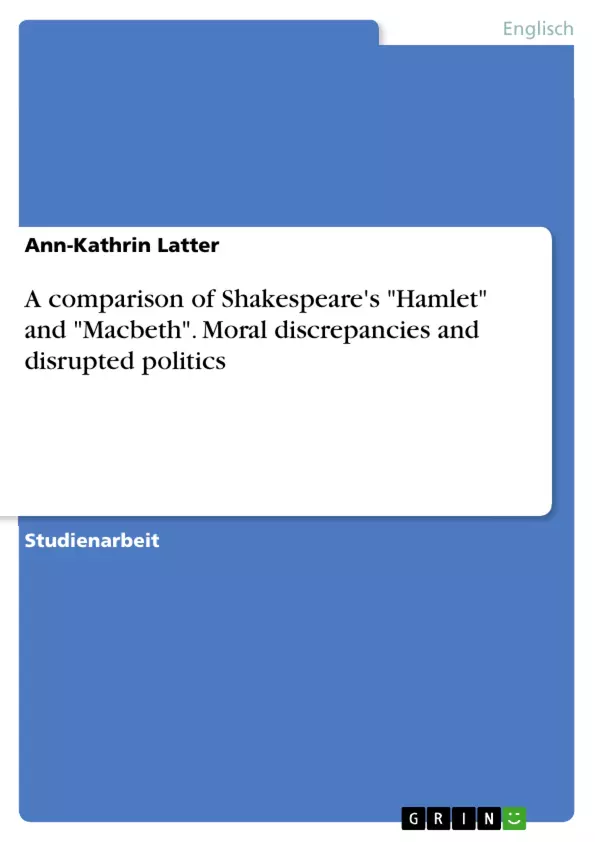Even to this day, Shakespeare’s plays are raising a series of — perhaps irresolvable — questions. First and foremost, the two tragedies of "Hamlet" and "Macbeth" have baffled generations of literary researchers who have been toiling away more or less successfully on the disclosure of their many secrets for centuries now.
With a closer look back at the major works of Shakespeare’s ingenious contemporary Thomas Hobbes this text tries to shed some light onto Shakespeare’s cryptic writings. Hobbes "Leviathan", in particular, takes up many of the issues inherent in "Hamlet" and "Macbeth" and, correspondingly, might help decode some of these mysteries.
By focusing on the mental and political disparities in "Hamlet" and "Macbeth", this text wants to explain how it comes to be that both tragic heroes add to the unrest in their respective states.
Inhaltsverzeichnis
- 1. Einleitung
- 2. Infizierte Gemüter: Moralische Diskrepanzen
- 3. Verdorbene Staaten: Die gestörte Politik
Zielsetzung und Themenschwerpunkte
Diese Arbeit untersucht die mentalen und politischen Diskrepanzen in Shakespeares Tragödien Hamlet und Macbeth und beleuchtet, wie die tragischen Helden zur Unruhe in ihren jeweiligen Staaten beitragen. Dabei wird der Einfluss von Hobbes' Leviathan auf Shakespeares Werk betrachtet.
- Moralische Degeneration der Protagonisten
- Der Einfluss von innerer Zerrissenheit auf das Handeln
- Die Verbindung zwischen individueller Krise und politischer Instabilität
- Das Motiv des Scheins und der Täuschung
- Die Rolle von Zweifel und Unsicherheit
Zusammenfassung der Kapitel
1. Einleitung: Die Einleitung stellt die zentrale Forschungsfrage nach dem Zusammenhang zwischen den Tragödien Shakespeares und den philosophischen Werken Hobbes' vor. Sie argumentiert, dass Hobbes' Leviathan ein besseres Verständnis der moralischen und politischen Konflikte in Hamlet und Macbeth ermöglichen kann, insbesondere im Hinblick auf die Entstehung und Bekämpfung von Unordnung im Staat. Die Arbeit fokussiert sich auf die Analyse der mentalen und politischen Diskrepanzen in den Tragödien und deren Auswirkungen auf die jeweiligen politischen Systeme. Der Bezug zu Hobbes' These, dass Verbrechen auf Mängeln des Verstandes oder der Vernunft beruhen, wird als Ausgangspunkt für die Untersuchung genutzt.
2. Infizierte Gemüter: Moralische Diskrepanzen: Dieses Kapitel analysiert die moralischen und mentalen Konflikte von Hamlet und Macbeth. Bei Hamlet wird seine übermäßige Trauer und Melancholie, die bis zur Selbstzerstörung führen könnte, untersucht. Seine Unentschlossenheit und die Unfähigkeit, zwischen Schein und Wirklichkeit zu unterscheiden, wird im Kontext seiner Aufgabe der Rache beleuchtet. Im Gegensatz dazu wird Macbeth als zunächst zögernder Protagonist dargestellt, der von Lady Macbeth zur Tat gedrängt wird. Das Kapitel verfolgt die fortschreitende moralische Degeneration Macbeths, von anfänglichen Skrupeln bis hin zur vollständigen Abstumpfung von Gefühlen, und untersucht die Auswirkungen dieser Entwicklung auf seine Handlungen und sein Verhältnis zu seiner Umgebung. Der Fokus liegt auf dem Kontrast zwischen innerer Wahrheit und äußerer Täuschung, sowie dem Einfluss von äußeren Kräften auf die Entwicklung der beiden Protagonisten.
3. Verdorbene Staaten: Die gestörte Politik: Dieses Kapitel untersucht die Darstellung von politischer Instabilität und Unordnung in Hamlet. Der Tod des alten Königs Hamlet wird als Ausgangspunkt für die allgemeine Verunsicherung und den Zerfall der gesellschaftlichen Ordnung dargestellt. Die Unklarheit um die Identität des Geistes und Hamlets zögerliches Handeln werden als Faktoren betrachtet, die zur Verschlimmerung der politischen Krise beitragen. Die Korruption im dänischen Hof und Hamlets Kampf dagegen bilden den thematischen Kern dieses Kapitels. Der Text beleuchtet, wie die individuellen Krisen der Protagonisten die politische Situation des Landes verschlimmern und zu einer umfassenden gesellschaftlichen Instabilität führen.
Schlüsselwörter
Shakespeare, Hamlet, Macbeth, Thomas Hobbes, Leviathan, Moral, Politik, Unordnung, Melancholie, Rache, Täuschung, Macht, Tyrannei, Verantwortung.
Häufig gestellte Fragen zu: Analyse von Shakespeares Tragödien im Kontext von Hobbes' Leviathan
Was ist der Gegenstand dieser Arbeit?
Diese Arbeit analysiert die mentalen und politischen Diskrepanzen in Shakespeares Tragödien Hamlet und Macbeth. Im Fokus steht der Zusammenhang zwischen den moralischen und politischen Konflikten in den Stücken und den philosophischen Werken Thomas Hobbes', insbesondere dem Leviathan. Die Arbeit untersucht, wie die tragischen Helden zur Unruhe in ihren jeweiligen Staaten beitragen und beleuchtet dabei den Einfluss von Hobbes' Philosophie auf Shakespeares Werk.
Welche Themen werden behandelt?
Die Arbeit behandelt Themen wie die moralische Degeneration der Protagonisten, den Einfluss innerer Zerrissenheit auf das Handeln, die Verbindung zwischen individueller Krise und politischer Instabilität, das Motiv des Scheins und der Täuschung, sowie die Rolle von Zweifel und Unsicherheit. Es wird untersucht, wie moralische und mentale Konflikte zu politischer Instabilität und Unordnung führen.
Welche Kapitel umfasst die Arbeit und worum geht es in ihnen?
Die Arbeit gliedert sich in drei Kapitel: Kapitel 1 (Einleitung) stellt die Forschungsfrage und den theoretischen Rahmen vor. Kapitel 2 ("Infizierte Gemüter: Moralische Diskrepanzen") analysiert die moralischen und mentalen Konflikte von Hamlet und Macbeth, ihre Entwicklung und die Ursachen. Kapitel 3 ("Verdorbene Staaten: Die gestörte Politik") untersucht die politische Instabilität in den Tragödien und deren Zusammenhang mit den Handlungen der Protagonisten.
Wie wird Hobbes' Leviathan in die Analyse einbezogen?
Hobbes' Leviathan dient als theoretischer Rahmen, um die moralischen und politischen Konflikte in Hamlet und Macbeth besser zu verstehen. Die Arbeit nutzt Hobbes' These, dass Verbrechen auf Mängeln des Verstandes oder der Vernunft beruhen, als Ausgangspunkt für die Untersuchung der Handlungen der Protagonisten und deren Auswirkungen auf die politische Ordnung.
Welche Schlüsselwörter beschreiben die Arbeit?
Schlüsselwörter sind: Shakespeare, Hamlet, Macbeth, Thomas Hobbes, Leviathan, Moral, Politik, Unordnung, Melancholie, Rache, Täuschung, Macht, Tyrannei, Verantwortung.
Welche zentralen Fragen werden in der Arbeit untersucht?
Die Arbeit untersucht den Zusammenhang zwischen den individuellen moralischen und mentalen Krisen der Protagonisten und der politischen Instabilität in ihren jeweiligen Staaten. Es wird hinterfragt, wie die Handlungen der Protagonisten die gesellschaftliche Ordnung beeinflussen und welche Rolle Hobbes' Philosophie dabei spielt.
Für wen ist diese Arbeit bestimmt?
Diese Arbeit ist für ein akademisches Publikum bestimmt, das sich für Shakespeare, Hobbes und die Verbindung von Literatur und Philosophie interessiert. Sie eignet sich besonders für Studierende der Literaturwissenschaft, Philosophie und Geschichte.
- Citar trabajo
- Ann-Kathrin Latter (Autor), 2015, A comparison of Shakespeare's "Hamlet" and "Macbeth". Moral discrepancies and disrupted politics, Múnich, GRIN Verlag, https://www.grin.com/document/354503



